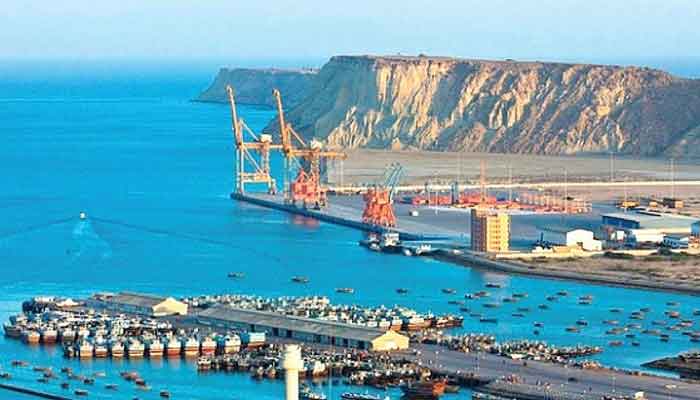Transit rules for cargo handling at Gwadar port implemented
KARACHI: Ministry of commerce has implemented prerequisite transshipment and transit rules for bulk cargoes at Gwadar port, which is to pave way for its full-fledged operation and ease handling burden on two other ports in the country, The News learnt on Thursday.
The ministry of commerce advised all the stakeholders that import and export policy order has been implemented through shipping procedure and instruments to operationalise trade through Gwadar port in Balochistan.
The ministry, in a letter, said the trade related infrastructure in Gwadar port is ready to handle bulk cargoes to and from Afghanistan. The letter was sent earlier this week to Pakistan Ship Agents Association, Pakistan International Freight Forwarders Association, National Logistics Cell and All Pakistan Shipping Association.
“The bulk cargoes imported in Gwadar port for onward transit to Afghanistan will be transported in containers after stuffing/loading the same into containers of international specifications,” the minister said in the letter.
Number of cargoes under Afghan transit trade increased 44 percent to 93,732 containers in 2018/19 from 60,516 containers in the fiscal year of 2017/18, official data showed.
Gwadar holds pivotal importance under the $60 billion China-Pakistan Economic Corridor framework – part of Belt and Road initiative to improve China’s connectivity in the region.
Shams Burney, chairman of All Pakistan Customs Bonded Carriers Association said handling of transit cargo in Gwadar port would help reduce congestion and traffic issues in Karachi port and Port Bin Qasim.
“We have high hopes for Gwadar port, which is set to become the most important port in the region and initiation of bulk cargo handling is a breakthrough for the port as well as the people of the region,” Burney said.
Burney negated the impression that all transit trade would gradually be shifting to Gwadar. When the transit trade rules were prepared back in 2010, Gwadar was included along with Karachi and Port Qasim, he said.
“Gwadar could not be utilised as it was not operational at that time. I believe all the ports would continue to deal with transit cargoes,” he added. “It is important that Gwadar provides proper storage and container handling facilities on competitive rates, otherwise traders would not opt for Gwadar.”
Currently, Pakistan has two main operating international deep sea ports: Karachi Port and Port Qasim. During the coming years, their capacity expansion programs are unlikely to keep pace with the expected growth in demand, resulting in a need for a third port to fill the gap.
In particular, Karachi Port has significant physical limitations and would not be able to grow at the same speed as the growth in cargo demand over the coming decades. These limitations result mainly from its location as it is located in the city, which has seen very rapid growth over the past years.
Possible speed of Port Qasim’s development, albeit having a large physical space for expansion, is hampered by its upstream location, which is more than 40 kilometres from the open sea, resulting in long turnaround times for visiting ships. This is not a problem for cargoes that are linked to industries located near the port, but it carries cost-disadvantages for cargoes that have origins and destinations elsewhere.
-
 Gracie Abrams Follows 'Kylie Jenner Playbook' With Paul Mescal Romance
Gracie Abrams Follows 'Kylie Jenner Playbook' With Paul Mescal Romance -
 Dua Lipa Shares 'Love Letter' With New Boyfriend After Emily Ratajkowski Confirms Romance With Her Previous Beau
Dua Lipa Shares 'Love Letter' With New Boyfriend After Emily Ratajkowski Confirms Romance With Her Previous Beau -
 Brazilian Beauty Influencer Passes Away After Suffering 'medical Emergency'
Brazilian Beauty Influencer Passes Away After Suffering 'medical Emergency' -
 Sarah Ferguson Turns Into A Bulldozer With Beatrice, Eugenie: ‘Help Me Out’
Sarah Ferguson Turns Into A Bulldozer With Beatrice, Eugenie: ‘Help Me Out’ -
 Australian Prime Minister's Letter Against Andrew Mountbatten-Windsor Made Public
Australian Prime Minister's Letter Against Andrew Mountbatten-Windsor Made Public -
 'Project Runway' Alum Tim Gunn Reveals Why He's Been Celibate For 43 Years
'Project Runway' Alum Tim Gunn Reveals Why He's Been Celibate For 43 Years -
 Delroy Lindo Breaks Silence On John Davidson's Racial Slur Shock At 2026 BAFTA: 'We Did What We Had To Do'
Delroy Lindo Breaks Silence On John Davidson's Racial Slur Shock At 2026 BAFTA: 'We Did What We Had To Do' -
 King Charles Prepares Next Move As Andrew Shows No Remorse
King Charles Prepares Next Move As Andrew Shows No Remorse -
 Epstein's Brother Invited To Discuss Royal Family's Future After Andrew's Arrest, On Popular Show
Epstein's Brother Invited To Discuss Royal Family's Future After Andrew's Arrest, On Popular Show -
 BAFTA Winner Robert Aramayo Defends Director's Racial Slurs Amid Tics
BAFTA Winner Robert Aramayo Defends Director's Racial Slurs Amid Tics -
 Prince William, Kate Middleton’s Troubles Take On A New Face: ‘They’re Steeling Themselves’
Prince William, Kate Middleton’s Troubles Take On A New Face: ‘They’re Steeling Themselves’ -
 'Coronation Street' Star Sally Ann Matthews Finally Reveals Why She Quit ITV Soap
'Coronation Street' Star Sally Ann Matthews Finally Reveals Why She Quit ITV Soap -
 Prince Andrew's Major Sacrifice For Princess Beatrice, Eugenie Royal Titles Revealed
Prince Andrew's Major Sacrifice For Princess Beatrice, Eugenie Royal Titles Revealed -
 ICE Agent Misfired Bullet Into Minnesota Hotel’s Guest Room
ICE Agent Misfired Bullet Into Minnesota Hotel’s Guest Room -
 Andrew Mountbatten-Windsor, Fergie Still Counting On Each Other? Deets
Andrew Mountbatten-Windsor, Fergie Still Counting On Each Other? Deets -
 Piers Morgan Reacts To Photo With Ghislaine Maxwell
Piers Morgan Reacts To Photo With Ghislaine Maxwell




